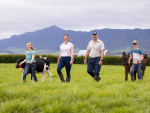Dairy farmers in most North Island regions are hard hit by rain which is hindering pasture utilisation and causing milk production to drop.
DairyNZ’s general manager for extension, Andrew Reid, says the problems with the wet extend from Northland to Waikato, Manawatu, Taranaki and Bay of Plenty. He says even the pumice country in the central North Island has been challenged by the wet.
Reid says few regions in the North Island haven’t received much higher rainfall than normal for the last two-three months.
But in contrast, the South Island has had a reasonable start to the season, except for Canterbury which is still affected by drought.
In the North Island, damage to paddocks is hindering pasture utilisation: farmers are unable to get enough pasture into cows.
“North Island pasture residuals have been higher than ideal because they can’t physically graze low enough to get feed into the stock, and supplement use has been justified even though we have passed balance date on most farms.
“Milk production is down for that reason and because many farmers have reduced cow numbers based on what the milk price was doing last season, so it is a combination of both,” Reid says.
The higher forecast milk price has given farmers confidence to use supplementary feed as an option.
But despite the optimism in the market the sector is not out of the woods yet.
“Mating is the focus of attention now, to ensure cows’ energy levels are good; at the moment these are ok but not startling.
“DairyNZ has been focusing on a pasture-first message and encouraging farmers to utilise pasture as best they can. That has been challenging given the mud lying around paddocks; then of course there is the need to watch the cost of production. When you are forced to buy supplement it doesn’t help, but hopefully this is just a short term issue.”











